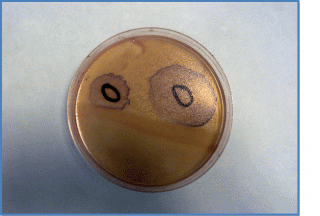Anger
How Spiteful Are You?
New research, and lessons from history, highlight the importance of spite.
Posted May 23, 2014

A statue of someone who is probably St. Ebba
To the extent that we've given it any thought at all, most of us probably assume that the expression “cutting off your nose to spite your face” is purely figurative. Who, after all, would be spiteful enough to engage in such an extreme and repulsive act of self-mutilation?
Actually it happened on a number of occasions during the early Middle Ages.
In the ninth century, Vikings attacked the monastery in Coldingham, England. Given the Vikings’ reputation for raping and pillaging (which always seem to go hand-and-hand), the abbess of the monastery cut off her nose and upper lip with a razor and encouraged the other nuns to do the same. When the Vikings arrived and saw a group of bloody nose-less women, they forwent the raping and concentrated on the pillaging. They still killed all the nuns and burned down the monastery, but the nuns’ virginity remained intact and the abbess was canonized as Saint Ebba.
[For a more detailed description of this and other medieval instances of homicidal barbarians and nuns engaging in self-rhinotomy see Jane Schulenburg’s excellent history, Forgetful of the Sex: Female Sanctity and Society (University of Chicago Press, 1998).]
If we follow the lead of behavioral economists and evolutionary biologists and define spiteful acts as those that involve paying a cost to inflict a cost on another, then the nuns’ actions certainly qualify as spiteful.

Bacteria killed by bacteriocins
But when it comes to spitefulness, the nuns may have met their match in certain single-celled bacteria. These bacteria have no noses to cut off, but they can produce bacteriocins—toxins that kill other bacteria lacking an immunity gene while sparing closely related bacteria. The catch is that releasing the bacteriocins is usually fatal to the microbial "suicide bomber." Thus, the act is both biologically adaptive—bacteria who share many genes with the actor thrive because the competition has been eliminated—and exceedingly spiteful.
We are a long way evolutionarily from bacteria, and chronologically from the early Middle Ages, so what role do spite and spitefulness play in our lives today?
One of the best ways to study spite is to use an ultimatum game paradigm. Imagine yourself in the following scenario: A stranger comes up to you and says that he was just given $20, under the conditions that:
- He has to share it with someone;
- He gets to decide how it is divided, but—
- If the person he offers the money to rejects the offer, no one gets anything.
In this ultimatum game, there is no negotiation and no second chance. Let's say the stranger offers you $8 and says he will keep $12. If you are like most people, you will probably take the $8. It’s not an even split, but it’s not too unfair and, after all, it’s free money.
Now imagine that instead of $20, it’s $20,000 and the offer is still $8, with the stranger proposing that he keep $19,992. Do you accept this offer? Probably not, even though you are turning down $8 of free money. In this latter instance, when you reject the offer, you're acting spitefully, suffering a harm to harm the greedy jerk who wanted to keep almost all of the money. Consider the price at which you would have accepted the offer: Would you have kept $100, $500, or only accepted an even split?
Where you draw the line might give you an idea of how spiteful you are.
Surprisingly, there has been very little psychological research examining individual differences in spitefulness. My colleagues Virgil Zeigler-Hill, Sterett Mercer, Alyssa Norris, and I recently developed a Spitefulness Scale to assess trait spitefulness. Respondents in our study indicated how much they agreed with statements like “It might be worth risking my reputation in order to spread gossip about someone I did not like” and “I would be willing to take a punch if it meant that someone I did not like would receive two punches.” (The study was discussed in a recent New York Times article on spitefulness that also considered the evolutionary benefits of spite)
People who reported higher levels of spitefulness, also scored higher on measures of aggression, narcissism, and psychopathy. Where do you think you'd land on the scale?


